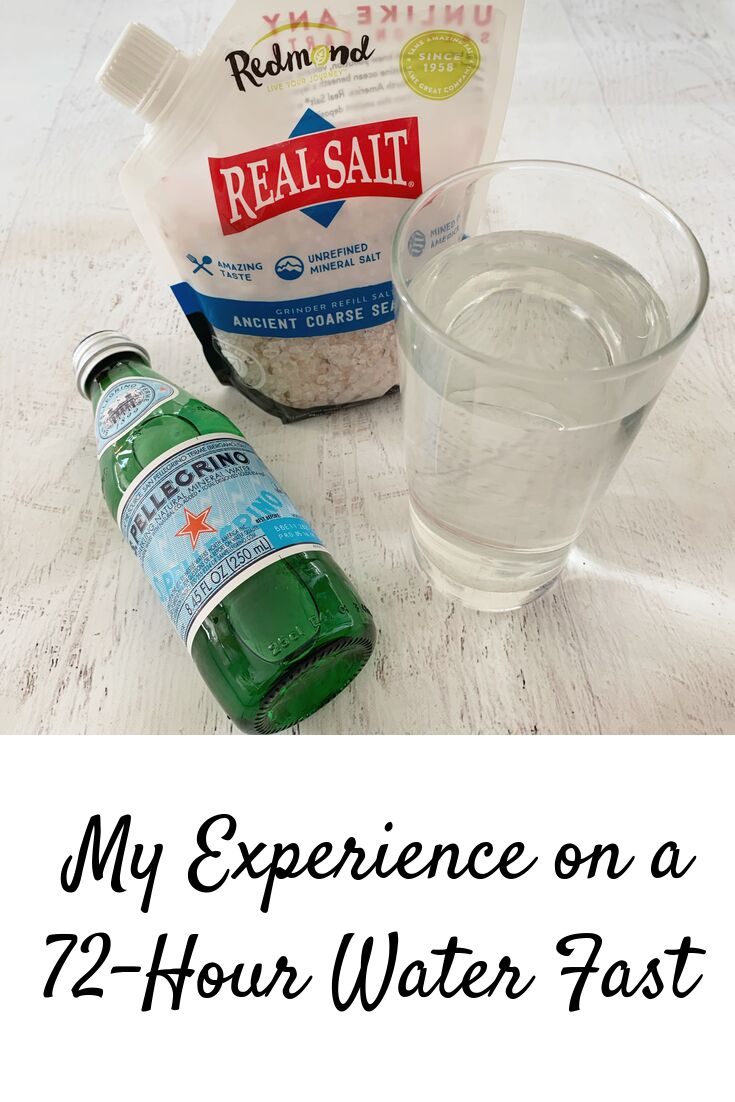Earlier this week I did a 72-hour water fast, and it was the longest fast I’ve done thus far. Fasting has a ton of health benefits, but it’s not for everyone. To learn more about fasting, I highly recommend listening to my podcast episode with Mike Mutzel here.
I don’t personally practice intermittent fasting, but I do like to incorporate a longer fast a few times a year to get the health benefits. Prior to this week, the longest I had fasted was somewhere over 48 hours…probably 55 or so. I wasn’t shooting for a specific number, so I just fasted until I needed food. This time, I wanted to do a full 72-hour fast specifically for health reasons, which I will explain more in a bit. Less frequent, extended fasts make the most sense to me in terms of evolution, because there were certainly times humans didn’t have access to food and would need to fast for a few days. I imagine they ate when they had food, and fasted when they didn’t – simple as that.
It’s probably obvious, but fasting means abstaining from food for a period of time. Some people consider juice “fasts” or smoothie “fasts” to be fasts, but I’m talking about an old school, straight up water fast. Water fasts are usually between 24 and 72 hours, and they’re typically medically supervised if any longer. People fast for religious reasons, to get ready for a procedure, to detox, for the mental health benefits, or for the many physical health benefits.
Some of the benefits of a water fast include:
- cell regeneration
- boosting the immune system
- reducing inflammation
- a rise in stem cells
- resetting your microbiome
- enhanced cognition
- improved insulin and leptin sensitivity
- autophagy
- improving blood pressure
- improving cholesterol levels
- reducing the risk of chronic diseases like cancer, diabetes, and heart disease
Fasting can also have mental health benefits, because it allows many people to re-evaluate their relationship with food. Fasting forces you to realize when you’re truly hungry and when you’re not, and makes you notice how many times a day you eat just because you can.
Why did I do a 72-hour water fast?
The jury is still out when it comes to how long someone has to fast to get XYZ benefits. I want to preface with that, because this is an area that is currently being researched a lot. I am also definitely not a fasting expert.
24 hours is a great place to start, but fasting for longer can have more benefits. When you fast longer than 24 hours, it allows your organs to rest, and your digestive system gets a big break. This means that other internal systems can focus on what they need to do. For example, your liver can really work on detox. The 48 hour mark is usually when you get into ketosis, because your stored glycogen is usually depleted by this point. So if someone just wants to get into ketosis, fasting for 48 hours is a pretty quick way to do it.
It seems that the 72 hour mark is when you get all the benefits, though – increased insulin sensitivity, reduced inflammation, better mental clarity, and cellular regeneration. When the body is in a state of autophagy, all of the metabolic waste gets removed from your cells, and weak or sick cells are removed. The body can even create new white blood cells by stimulating stem cell activation. This is how fasting for a full 72 hours can regenerate your immune system. You can get some of these benefits in 2 days, but the 72 hour mark is where researchers have seen optimal results – lower white blood cell counts, the regeneration of new white blood cells, reduced PKA enzyme levels, and lower IGF-1 hormone levels (markers of longevity). This is also why extended fasts are popular for those battling cancer. Studies have shown that 72-hour fasts can help protect chemo patients against toxicity from treatment, and fasting helps to weaken cancer overall.
Those are the textbook benefits, but why did I do it? I’ve been working on healing from mold toxicity, autoimmune issues, gut issues, and other TBD health issues for some time, and my body has been in overdrive the last few months in particular. I’ve been extremely inflamed, and in the last couple of months (after I got food poisoning…which was a huge trigger for my body) my gut symptoms were at their worst. After getting some bloodwork back, it was clear my body needed a break. A 72-hour fast was the best way to do that and to allow for a much-needed boost in my immune system and a reduction in my inflammation. I was also going to change my diet, so fasting before making the transition helped a lot.
What did I consume / do during the fast?
I ate no food for 72 hours. I drank plenty of plain high-quality spring water and sparkling water, because the carbonation can help with feelings of fullness. I also consumed plenty of high quality sea salt for electrolyte balance. And when I say plenty of salt, I mean a lot of salt. I looove my salt. My favorite is Redmond’s Real Salt. I didn’t count my intake of anything. Most people recommend at least 2-3 liters of water per day, and I’m sure I drank that.
Depending on your goals, adding coffee or tea probably wouldn’t affect things. I drank a cup of dandelion tea out of habit. I thought about having some green tea, but I didn’t really need it. I felt like as long as I was doing a water fast, I should stick to water as much as possible. To get the full benefits of a fast, you don’t want to drink anything with any calories. Caffeine and certain “sweet” flavors definitely affect my blood sugar (I rarely consume caffeine), so I didn’t really want to add in much else – best to stick with water.
Everyone has a different experience on a fast. For me, the first half of the fast was more difficult in terms of hunger than the second half, but still not too difficult. The hunger would come and go in waves, and anytime I felt hungry, I would just drink a full cup of water and extra sea salt. San Pellegrino also helped at that time – again, the carbonation helps with feeling full. For me, though, the hunger was never too bad.
I was very tired, though – a lot more than when I’ve fasted previously. Each day I got more and more tired, and by the third day, even though I wasn’t really hungry, I definitely needed to break my fast so that I could function for the rest of my work week. When I say tired, I was both sleepy and physically exhausted / weak. I have exercised on previous fasts, but I was too tired to exercise this time. Instead I went on walks the first and second days, but by the third day I was pretty much in my bed because I was so tired. This is probably because I am much weaker in general right now than I have been on previous fasts, while I am actively going through treatment, doing ozone therapy, etc.
Something else that was different this time – I was very hot. I’m usually cold on fasts, but this time I was really warm. There could be a number of reasons for this, but Mike Mutzel told me that ketones can sometimes raise body temperature because of an increase in uncoupling proteins (causing fat cells to make heat).
I slept as much as I could to make the fast go by more quickly. I knew I was going to do a fast, but didn’t know exactly when, so I decided to just start on Sunday after having slept in very late already (I got home at 2 AM Saturday night and slept until noon on Sunday!). This was easier for me than planning ahead of time, because if I know that I’m eating my last meal for 3 days, it’s more likely that I’ll really overeat right before – psychology. It works better for me if I just fall into it and eat a normal amount the day before starting. Thankfully, I work for myself and work from home, so I could prioritize sleeping as much as possible during the full 72-hour fast. I definitely wasn’t sleeping the whole time (I wish!), but I got 10 hours of sleep each night, which meant less time being awake during it. Ha!
I also checked my ketones during the process, which was pretty interesting. A little background – I was in ketosis for a few years, and in the last year I’ve been completely out of it. The first day I wasn’t in ketosis. On day 2, I was at 1.4 mmol/L. Mid-morning on day 3 I was 2.9, and then before I broke my fast that night, I was at 1.7. I felt like these numbers were very odd, but who knows what was going on.
Physically, I did lose a lot of inflammation, and my gut improved a lot. However, I didn’t see any noticeable improvements until the third day! The first two days, my inflammation and gut felt the same, so I am glad I went the full 72 hours. (Obviously there were plenty of other benefits I couldn’t physically notice, though.) I did drop about 10 pounds of water weight, but obviously that came back when I went back to normal activities.
Breaking the Fast
You really want to be gentle when you break your fast, because your digestive system hasn’t consumed food for 72 hours. If you eat a very big meal it will probably cause a lot of uncomfortable digestive symptoms, so it’s best to start small and gentle. Don’t be surprised if whatever you eat goes straight through you.
I broke my fast with some Osso Good Bone Broth, and then about an hour later I ate roasted zucchini and fennel with some ground turkey and a bit of olive oil. And salt, of course. I wanted something gentle on my stomach, and this worked perfectly well. I broke my fast at night, so after that meal I went to bed and went back to regular eating the next day.
Fasting is not for everyone, and I recommend chatting with your doctor before doing an extended fast. It’s crucial to stay hydrated and to keep your electrolytes balanced during your fast, and you want to make sure it won’t negatively affect your unique body before you try it out. If you have an eating disorder, I do not recommend fasting. I also do not recommend fasting if you are doing it just to lose weight. It might cause a more disordered relationship with food. You probably will lose weight, but it will most likely be water weight, and it will come back once you start eating food again. For some people, this can mess with their heads and lead to a cycle of yo-yo dieting. A 72-hour fast is not an effective way to burn fat – its health benefits are really outside of weight loss.
Personally, I had a good experience overall and think it’s exactly what my body needed while I’m in a period of detox.
Have you done an extended fast? Tell me about your experience below!






Get Updates
And Goodies
We’re over fake “wellness.” It’s time to unlock your magic & magnetism. Are you ready to vibe higher?
Are you ready to finally optimize your health habits for real results and true health?